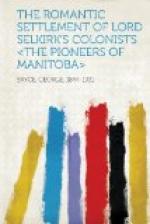In such a run, a good horse and experienced rider will select and kill from ten to twelve buffaloes at one heat, but in the case before us, the surface was rocky and full of badger holes. Twenty-three horses and riders were at one moment all sprawling on the ground, one horse gored by a bull, was killed on the spot, two more were disabled by the fall. One rider broke his shoulder blade, another burst his gun, and lost three fingers by the accident, another was struck on the knee by an exhausted bull. In the evening no less than 1,375 tongues were brought into camp. When the run is over the hunter’s work is now retrograde. The last animal killed is the first skinned, and night not unfrequently, surprises the runner at his work. What then remains is lost and falls to the wolves. Hundreds of dead buffaloes are often abandoned, for even a thunderstorm, in one hour, will render the meat useless.
The day of a race is as fatiguing on the hunter as on the horse, but the meat well in the camp, he enjoys the very luxury of idleness.
Then the task of the women begins, who do all the rest, and what with skins, and meat and fat, their duty is a most laborious one.
It is to be regretted that much of the meat is wasted. Our expedition killed not less than 2,500 buffaloes, and out of all these made 375 bags of pemmican, and 240 bales of dried meat; 750 animals should have made that amount, so that a great quantity was wasted. Of course, the buffalo skins were saved and had their value.
Our party were now on the Missouri and encamped there. A few traders went to the nearest American fort, and bartered furs for articles they needed.
After passing a week on the banks of the Missouri we turned to the West, when we had a few races with various success. We were afterwards led backwards and forwards at the pleasure of the buffalo herds. They crossed and recrossed our path until we had travelled to almost every point of the compass.
Having had various altercations with the Indians, the party reached Red River, bringing about 900 lbs. of buffalo meat in each cart, making more than one million pounds in all. The Hudson’s Bay Company took a considerable amount of this, and the remainder went to supply the wants of the Red River Settlement for another year.
CHAPTER XXII.
What the Stargazers saw.
The writer remembers meeting in Boston, a good many years ago, a scientific explorer, who along with two companies, one of whom is the greatest astronomer in the United States, as an astronomical party in 1860, made a visit through Red River Settlement, on their way to the North Saskatchewan to observe an eclipse. The disappointment of the party was very great, for, after travelling three thousand miles, their fate was “to sit in a marsh and view the eclipse through the clouds, so heavy was the rain.”




